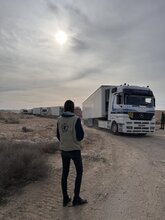United Nations in Jordan Observes Three Years since Outbreak of Syrian Conflict
Amman, 15 March 2014 – Three years after the beginning of the devastating conflict in Syria, some 585,000 Syrians have fled their homes for safety in Jordan. Over half of the Syrian refugees in Jordan are children, who have witnessed unspeakable horrors and whose lives have been interrupted by violence and displacement. Most Syrian refugees have been displaced several times inside Syria before they took the difficult decision to leave their home country. After over 1,000 days of conflict the violence shows no sign of abating
Only 20 percent of refugees in Jordan reside inside refugee camps, while the majority live in villages, towns and cities across the country. This has added to the strain on the country’s health, education and hygiene services as well as water resources, given that Jordan is the fourth most water insecure country in the world.
There is an urgent need to maintain a protective environment for Syrian refugees in Jordan, invest in education, psychosocial support and nutrition, while alleviating the added strain on services in host communities, according to the United Nations. The United Nations High Commissioner for Refugees (UNHCR), United Nations Children’s Fund (UNICEF) and the World Food Programme (WFP) are working in tandem to respond to the needs of Syrian refugees in Jordan, including the provision of food assistance, shelter, protection, health, education and water.
“UNHCR is very thankful to the Jordanian Government and its people for receiving their Syrian neighbours so generously”, says Andrew Harper, UNHCR’s representative in Jordan. “This hospitality comes at a price to Jordan. This is why our work is to help refugees directly with shelter and other essential services, but also to support host communities with projects they need so that Jordan does not carry the burden alone. More needs to be done, every day. This is the commitment of UNHCR and all involved in the refugee response to Jordan”.
Rozanne Chorlton, UNICEF Jordan Representative (a.i.), said, “Three years on, the lives of Syrian children have been interrupted by violence and exploitation. But childhoods cannot be put on hold. It is our responsibility to invest in their education and to provide them with an environment where they are protected from harm. We must give them an opportunity to resume their childhood to avert a lost generation.”
“Refugee families are having to stay longer in Jordan as they cannot go home. Most families have used whatever savings or resources they had when they came from Syria. WFP therefore continues to provide food assistance to Syrian refugees through food vouchers which allow them to buy their food from local Jordanian shops around the country. This also benefits the Jordanian economy, creating additional jobs and investment in the retail sector,” explained Jonathan Campbell, the UN World Food Programme’s Emergency Coordinator for Syrian refugees in Jordan.
At the end of last year, UN agencies launched the Jordan component of the Regional Response Plan (RRP6), with a total of over USD 1.2 billion, based on a projection of up to 800,000 Syrian refuges living in Jordan by the end of 2014. To date, with close to USD 186 million received, only 15% of the funding needs for this year have been covered.
For more information, please contact:
Hélène Daubelcour, UNHCR Jordan, daubelco@unhcr.org, +962 (0) 798 891 307
Ali Bibi, UNHCR Jordan, bibia@unhcr.org, + 962 (0) 777 711 118
Miraj Pradhan, UNICEF Jordan, mpradhan@unicef.org, +962 (0) 790 214 191
Fatima Azzeh, UNICEF Jordan, fazzeh@unicef.org, +962 (0) 797 056 306
Dina El-Kassaby, WFP Jordan, dina.elkassaby@wfp.org, +962 (0) 798 674 638

